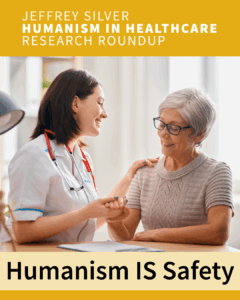
The Jeffrey Silver Humanism in Healthcare Research Roundup features summaries of recently published studies on humanism in healthcare. To receive email notification of new studies once per month, enter your information here and select “Jeffrey Silver Research Roundup” from the checkboxes at the bottom. See previous posts in this series.
What do you like about Research Roundup? We are considering modifying the format and would very much appreciate your thoughts. Please take our brief 10-question survey. Thank you!
Publications from Gold Foundation-Affiliated Authors
An integrative review of nurse-to-nurse incivility, hostility, and workplace violence: A GPS for nurse leaders. Crawford CL, Chu F, Judson LH, Cuenca E, Jadalla AA, Tze-Polo L, Kawar LN, Runnels C, Garvida R Jr. Nurs Adm Q. 2019 Apr/Jun;43(2):138-156.
Drs. Cecelia Crawford, Lorie Judson, Emma Cuenca, AJ Jadalla, and Lina Najib Kawar along with Ms. Frances Chu, Ms. Lisa Tze-Polo, and Ms. Cindy Runnels are Mapping the Landscape grantees.
Nurse-to-nurse incivility remains a widespread issue in the workplace setting. This integrative review examined 21 articles related to incivility, bullying, and workplace violence for 4 different groups (student nurses, new graduate nurses, experienced nurses, and faculty). The review identified incidents, antecedents, and targets of incivility/bullying, which contribute to 84 negative outcomes. Five overarching themes emerged: Rite of Passage, Structural Bullying by Manager/Supervisor, Nurses “Eat Their Young,” Out of the Clique, and Leaving the Job or Profession. The authors recommend a consistent and clear response to incivility and offer evidence-based guidance for promoting workplace civility.
An interprofessional standardized patient case for improving collaboration, shared accountability, and respect in team-based family discussions Free full text Kusnoor AV, Gill AC, Hatfield CL, Ordonez N, Dello Stritto R, Landrum P, Teal CR, Ismail N. MedEdPORTAL. 2019 Jan 4;15:10791.
Dr. Cayla Teal is a Mapping the Landscape grantee.
Interprofessional collaboration, while so important to patient safety and quality care, is often missing from health education. Would a simulation with a standardized patient, handled together by students from different health professional schools, offer an opportunity to teach communication and teamwork? This study evaluated the use of simulation among 1,151 senior students from colleges of nursing, pharmacy and medicine. Each interprofessional group participated in an icebreaker to get to know one another, prepared a plan together, and then together disclosed a medical error to a standardized patient, who later evaluated the team performance. Survey results showed that students achieved interprofessional collaboration competencies. In debriefing, students shared that this experience helped them to understand the roles and perspectives of other team members.
Defining compassion in the digital health age: protocol for a scoping review Free full text Wiljer D, Charow R, Costin H, Sequeira L, Anderson M, Strudwick G, Tripp T, Crawford A. BMJ Open. 2019 Feb 15;9(2):e026338.
Dr. David Wiljer and Ms. Melanie Anderson are Mapping the Landscape grantees.
The role of compassion is drawing increasing attention both in training and in practice, yet digital contexts are not usually considered. New technologies are allowing for a transformation of patient experience, including greater potential empowerment by patients to access their data and track their symptoms and greater potential accessibility through text messages, email, video chats, etc. Yet digital communication can also lack the emotional in-person cues that convey empathy. How should compassion be exercised while using digital health technologies? This article outlines the protocol for a forthcoming scoping review that aims to provide a baseline understanding of the state of compassion in the field of digital health technologies.
Applications of the reflective practice questionnaire in medical education Free full text Rogers SL, Priddis LE, Michels N, Tieman M, Van Winkle LJ. BMC Med Educ. 2019 Feb 7;19(1):47.
Dr. Nicole Michels is a Mapping the Landscape grantee.
The Reflective Practice Questionnaire (RPQ) is new 40-item self-report questionnaire used to measure reflective capacity. This study examined its potential uses in medical education. RPQ subscales include constructs of desire for improvement, confidence, stress, and job satisfaction. 98 fourth-year U.S. medical students completed the instrument, and their scores were compared with prior scores from the general public and mental health practitioners in Australia. Medical students scored higher than the public sample for reflective capacity but their scores were statistically indifferent from the practitioner sample. Medical students’ scores of reflective capacity were associated with features of confidence, stress, and desire for improvement. Confidence in communicating with patients was positively associated with job satisfaction, while stress when interacting with patients was negatively associated with job satisfaction. The RPQ instrument had a Cronbach’s alpha value = 0.84 for the total scale and Cronbach’s alpha values ranged from 0.75 to 0.83 on the subscales. The authors conclude that the RPQ can be used to measure reflective capacity in medical students following self-reflection activities, as part of professional development, and to identify students who might benefit from targeted interventions.
Interventions to Prevent and Reduce Burnout Among Undergraduate and Graduate Medical Education Trainees: a Systematic Review Walsh AL, Lehmann S, Zabinski J, Truskey M, Purvis T, Gould NF, Stagno S, Chisolm MS. Acad Psychiatry. 2019 Feb 1.
Drs. Anne Leonpacher, Jeffrey Zabinski, Neda Gould, Susan Stagno, and Margaret Chisolm along with Ms. Maria Truskey and Ms. Taylor Purvis are Mapping the Landscape grantees.
What interventions prevent or reduce burnout among medical students and residents? This systematic review searched 10 databases and identified 14 studies that described educational interventions for medical students and/or residents; all used the Maslach Burnout Inventory but none of the studies evaluated burnout as the main variable. Most (12) of the studies were focused on residents. Nine studies examined individual-level interventions; five studies examined organization-level change. Five of the studies reported statistically significant improvements in burnout scores and one reported that burnout scores worsened. The authors conclude that there is a need for further development of rigorous studies around preventing burnout in medical education, especially for medical students.
Pediatric Palliative Care in the Multi-Cultural Context: Findings from a workshop conference Free full text Rosenberg AR, Bona K, Coker T, Feudtner C, Houston K, Ibrahim A, Macauley R, Wolfe J, Hays R. J Pain Symptom Manage. 2019 Jan 24. pii: S0885-3924(19)30038-7.
Dr. Chris Feudtner is a Mapping the Landscape grantee.
How can we ensure pediatric palliative care is respectful and sensitive in our multicultural world? This study identified recommendations drawn from a one-day workshop with 142 pediatric clinicians operating in diverse contexts of pediatric palliative care. The clinicians participated in one of four workshops related to race/ethnicity, economic disparity, religion/spirituality, or family values. Participants identified cultural differences and then the teams discussed strategies for communication and clinical care. Three themes emerged from the discussion: (1) “how we speak,” (2) “how we think,” and (3) “how we learn.” (“We” refers to pediatric clinicians.) Participants suggested specific phrases to use during difficult situations, as well as specific approaches to training and clinical care. Participants from all groups agreed that there was a need for more research in this area.
Is research on professional identity formation biased? Early insights from a scoping review and metasynthesis. Volpe RL, Hopkins M, Haidet P, Wolpaw DR, Adams NE. Med Educ. 2019 Feb;53(2):119-132.
Drs. Rebecca Volpe, Paul Haidet, and Daniel Wolpaw along with Ms. Margaret Hopkins and Ms. Nancy Adams are Mapping the Landscape grantees.
Professional identity formation (PIF) is increasingly seen as a critical part of the development of physicians, but what empirical evidence has emerged so far? This scoping review (92 studies) and qualitative metasynthesis (29 articles) examined literature in medicine, nursing, and psychology students related to PIF. Three themes emerged: (1) the importance of clinical experience, (2) the role of trainees’ expectations, and (3) the impact of broader professional culture and systems on PIF. During the review, the authors noticed that PIF research did not often consider the impact of race, gender, or socio-economic status; the authors ran a second analysis and discovered only 10 of the articles considered sociocultural data. The authors note that by excluding demographic considerations, the default assumption is to assume a PIF based on a “member of the hegemony: an upper middle class white male.” The authors urge thoughtful focus on demographic variables in future examinations of PIF.
Racial/ethnic differences in prognosis communication during initial inpatient palliative care consultations among people with advanced cancer. Ingersoll LT, Alexander SC, Priest J, Ladwig S, Anderson W, Fiscella K, Epstein RM, Norton SA, Gramling R.Patient Educ Couns. 2019 Jan 2. pii: S0738-3991(18)30694-3.
Dr. Ronald Epstein is a Mapping the Landscape grantee.
Do clinicians communicate differently to patients of certain races and ethnicities regarding their prognosis? In this study, initial consultations involving 54 clinicians and 231 hospitalized patients with advanced cancer were audio recorded and analyzed. During conversations with 48 Black and Latino patients, prognosis communication occurred less than half the time compared with other patients. Moreover, those conversations were 8 times less likely to contain optimistic cues. Evidence supports prognosis communication being valued when making end-of-life choices. The authors note that more research is needed to understand these patterns; this area may be a good target for developing interventions that help eliminate disparities in EOL care.
Other Publications
Association of Physicians’ Self-Compassion with Work Engagement, Exhaustion, and Professional Life Satisfaction Free full text Babenko O, Mosewich AD, Lee A, Koppula S.Med Sci (Basel). 2019 Feb 12;7(2). pii: E29.
What is the relationship between self-compassion and well-being for physicians, who typically face stress and uncertainty in their work? 57 physicians participated in this study, which used 33 items to survey self-compassion, work engagement and exhaustion, and professional life satisfaction. Results supported that self-compassionate physicians experienced increased work engagement, decreased exhaustion, and increased professional life satisfaction. The authors recommend additional research to learn how best to increase self-compassion for future and practicing physicians.



